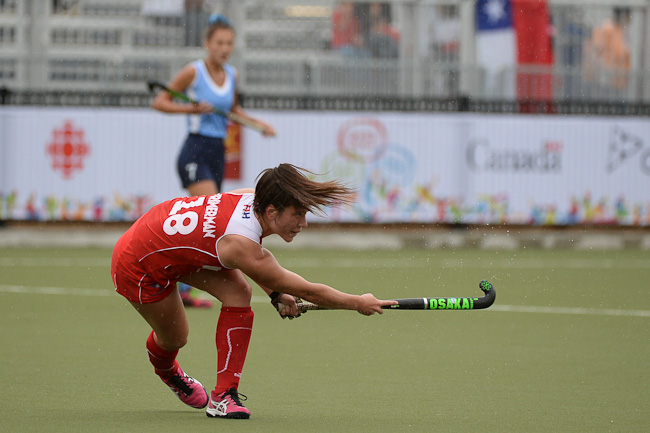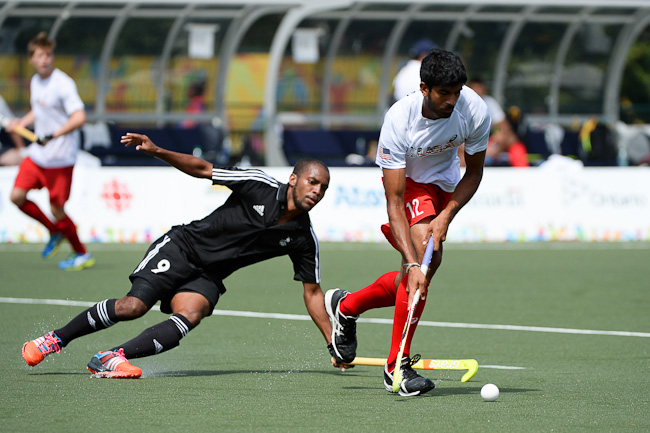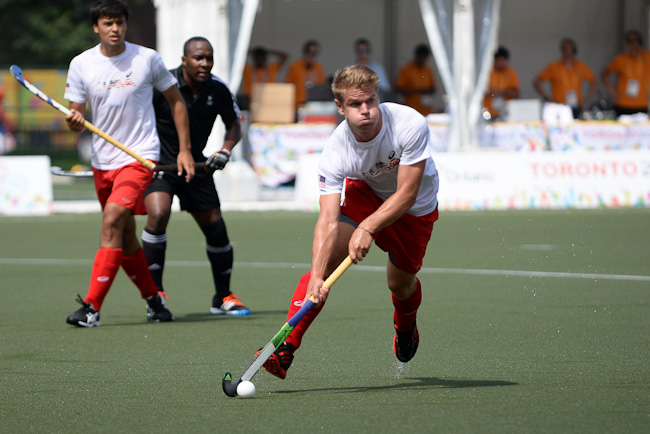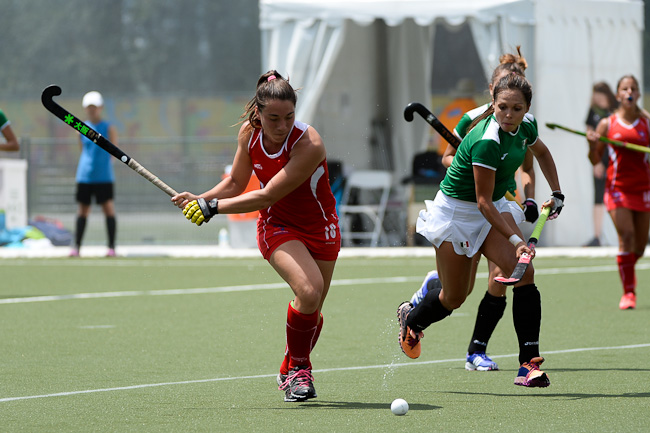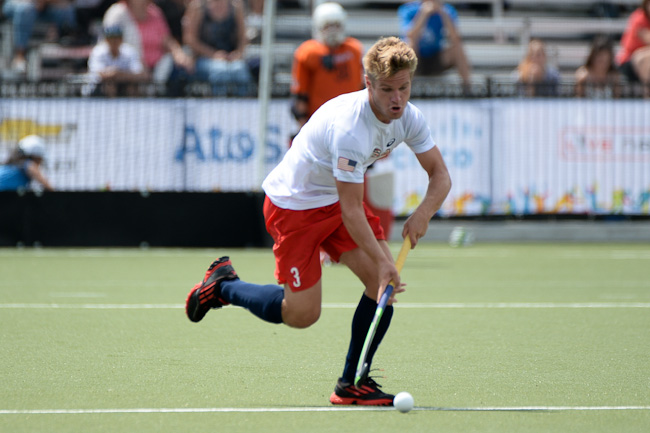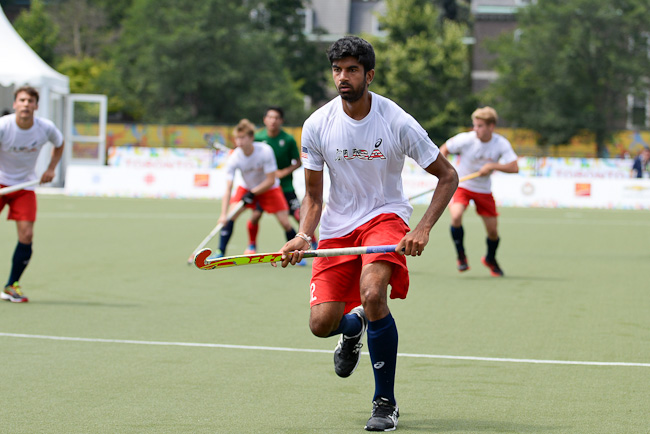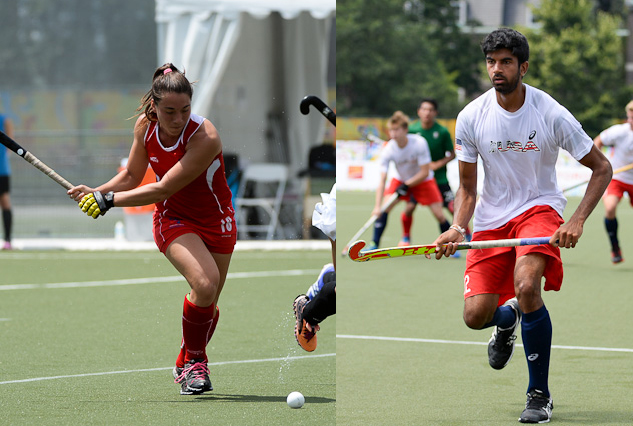
For the young players who will be participating in the Junior Pan American Championships in Trinidad & Tobago and Canada over the next few months, hockey will be at the forefront of their mind. However, as Sarah Juggins discovers, these young players face a real challenge when it comes to keeping a good balance between sport and study.
Denise Krimerman is a hockey player with the Chilean women’s national squad and has already got a raft of senior team experience under her belt. She was part of the squad that narrowly lost out in the bronze medal match to host nations Canada in the 2015 Pan American Games. Prior to that, Denise and her team won two silver medals at the 2014 South American Games and the 2013 South American Championships. She also played a key role in Chile’s third place finish in the 2015 World League Round Two event in Dublin, scoring three goals over the course of four games.
This year, the 21-year-old will be competing for the Chilean team in the Pan Am Junior Championship and hoping to improve on the fourth place finish of 2012. Chile has a good record at the games with one silver, two bronze and three fourth place finishes.
Besides her hockey training schedule, Denise is a student at Universidad del Desarrollo, in Concepcion. So how does she combine study and representing her country?
“It is difficult,” she admits. “We must learn how to organize and manage our time during the day. However, it helps that our training sessions are usually in the afternoon and my university classes are in the morning. I use any free time – and there is not much admittedly - to catch up on studies.”
So far, Denise has managed to organize her time effectively and she says she feels very confident that her university lecturers would be sympathetic and help if she asked them to be flexible, but you get the impression that this is a person with their feet firmly on the ground. “My family’s support is crucial,” she says. “I started playing because of their encouragement and they motivate me constantly to achieve my goals.”
The fact that hockey remains an amateur game in Chile and is still very much a sport that is establishing itself demonstrates that the national squads at all levels are very much punching above their weight. Chile men and women are constantly runners-up to the hockey heavyweights in the Pan American region – Argentina, USA and Canada – and to maintain that level of consistency is no mean feat.
“We sacrifice a lot of things to play hockey in Chile,” says Denise, but you sense from her lively enthusiasm that this is not a hardship.
Sophia Lahsen is another member of the Chile team. She has yet to make a breakthrough into the senior squad on a regular basis but she is a prolific goal scorer for the U21 team. Like Denise, Sophia goes to college in the mornings and early afternoon and then does hockey training in the evening. One of her biggest concerns is that she may overdo things and burn out or let something slip - either in her studies or her sport. “I think the key to achieving a balance lies in being organized, and make good use of the time,” she says. “I need to take responsibility for myself and realize when I need to take a break or decrease the intensity of my training.”
Sophia has learnt the hard way. “Many times in the past, I have collapsed because I haven’t been able to take time out to study enough or simply just rest. Then I got frustrated and I didn't know how to sort out the situation.”
Help came from family and friends. “I talked to my family and friends, and then I realized that I am very supported by them and that I have to learn how to control my anxiety and despair because it only make me feel down and it also affects my performance in hockey.
“The person that I most talk about it all with is my dad. He helps me very much, gives me a lot of very good advice and supports me in every decision that I make.”
Sophia’s parents really have proven a rock as pressures of balancing study and sport have taken their toll. “As I said, without them I wouldn't know how to sort out my problems. My parents give me a lot of support in terms of hockey so that encourages me to keep training and performing even when I'm full of pressure from tests and stuff at college.”
Despite the obvious stress that Sophia sometimes feels under, the athlete is under no illusions that she is the only one. “I think it is something that happens to all athletes in their respective sports. We all make sacrifices. Like waking up earlier than everyone else to train before going to college, or not being able to go out with friends or going on vacations. But after all it's not an obligation, it's a decision that you take that, at the end, brings its own benefits.”
Michael Barminski is an athlete for the USA field hockey team. He took to field hockey early in his school life when the sport was introduced to him in an after-school program. With the encouragement and enthusiasm of his mother, a former player herself, Barminski competed in Cal Cup and was instantly hooked. He has since taken to the pitch on the international stage with both the USA Men's Junior National Team and senior national team, competing in World League Round One and Two, Junior Pan American Championship and Pan American Games.
Like both Denise and Sophia, Michael knows that the only way he can fit everything into his daily schedule is through a very careful balance of work and hockey. Michael has the added stress of holding down three jobs while training with the national squad and studying Earth Sciences at the University of California in San Diego.
He explains the pressure he is under to keep all aspects of his life under control: “Balancing school, field hockey and work is a difficult task for anyone because of the extensive time management and discipline that it requires. My typical day consists of training from 6am - 9:30am, class from10am - 2pm., topped off with several hours of work at one of my three jobs. That doesn’t leave a lot of time for extra-curricular activities, but I just plan far enough ahead to get in some physical recovery and extra studying.
Michael has this tip for making the most of your time: “Those little 30 minute blocks of time when you find yourself on the bus or waiting in between classes, are vital to the productivity of your day. The task of juggling multiple agendas can be quite hectic at times, but I can assure you it is a very rewarding experience to make sacrifices in order to support a lifestyle that is Olympic caliber.”
Michael’s team mate in the USA Junior team is Ajai Dhadwal, a silky-skilled midfielder who has represented his country at junior and senior level. Ajai first picked up a stick when he was eight years old and hasn’t looked back since.
These days the 22-year-old combines hockey with his studies at the John Hopkins University in California where he is studying cognitive science. For Ajai, achieving balance is all about attitude.
“Balancing work, studies and being on the national team is more about attitude than anything,” he says. “It is a difficult thing to do, but I enjoy being busy and doing things that I am genuinely interested in. Occasionally, one of the aspects of my life becomes hectic, but the other activities tend to help to restore balance.
“Playing hockey has always been a passion of mine so it is relaxing even though it is an intense elite lifestyle. The most important thing is to enjoy and to be mindful of what I am doing.”
All four athletes will be ramping up the training as the Junior Pan Am Championships loom on the horizon and it will take all their organizational skills to ensure that they maintain a crucial life balance during the hectic months ahead.
